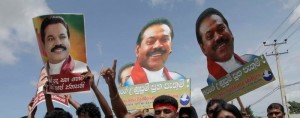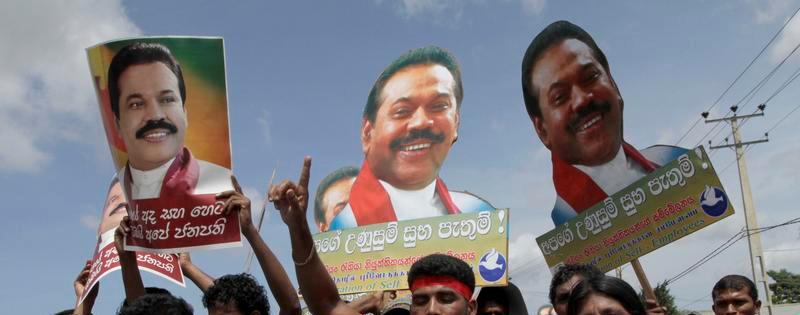 |
| ….political system can slide into dictatorship without that being quite intended |
Further observations on impeachment by Izeth Hussain
Far and away the most impressive feature of the 1977 UNP Government was the depth of its dedication to injustice. I am not being ironic as the reader might suppose, I am being factual. I note two facts: there is in humanity a thirst for justice; there is also in humanity a thirst for injustice. It pleases us to note that everywhere in the world people think in terms of right and wrong, that they want the right to prevail over the wrong, and they want a just society in which justice reigns supreme. We have to note however that quite often, too often in fact, the wrong prevails over the right, and there is no justice worth speaking about.
We tend to think of this as a failure, a failure to reach the ideal of justice. The facts suggest otherwise: there are people for whom injustice, not justice, is the ideal. When such people predominate in the State, even a paradise isle becomes a hell on earth for a substantial proportion of the people.
I will now note some hard facts that point to the 1977 UNP Government’s immensely impressive dedication to injustice. As soon as it came to power the mobs went on the rampage against the fallen supporters of the SLFP. Nothing novel about that because post-election violence has been a fact of our political life for decades. What was novel in 1977 was that the UNP leader had in advance of the elections declared that the police would be given leave in their aftermath, obviously meaning that the mobs were to be given license to go on the rampage with impunity. There followed within three weeks the first of the State-sponsored pogroms against the Tamils, inaugurating an era of anti-Tamil violence that rose to a mad genocidal crescendo in 1983. Today it has come to be widely recognized that the imprimatur of the State was clearly writ on the 1983 pogrom. It is a significant fact that there were no anti-Tamil riots between 1958 and 1977. It becomes arguable that the Tamil quest for Eelam took a militantly violent form as a consequence of the UNP Government’s dedication to injustice taking a violent form against our Tamils.
JRJ government
It had to be expected of course that with the 1977 Government’s dedication to injustice the Judiciary would come in for special attention. So it did. Not long after coming to power, the Judiciary was cast into a new form with several judges being kicked out of office, clearly signifying that the independence of the Judiciary would be tolerated only within limits circumscribed by the new Government. It proceeded later to humiliate the Supreme Court Judges by getting hooligans to stone their houses. I will not go into all the details about action by that Government in its endeavor to hold the Judiciary on a tight leash. Instead I will point to just one horrifying episode.
Gonawila Sunil, a notorious gangster, was convicted along with others of gang rape and jailed. It turned out that he was a devoted UNP member, and was evidently highly esteemed by the top brass of the 1977 Government because very quickly he was given a Presidential pardon. I am told that he was escorted out of jail by a leading member of the Government. Thereafter he was made an All-Island Justice of the Peace, and I am told absorbed into the UNP’s Central Committee.
It is known of course that when Governments go rotten and start stinking they use gangsters for their nefarious purposes and reward them in various ways. But usually that is done clandestinely and with subtlety, without affronting and outraging the requirements of the rule of law and elementary standards of morality. The 1977 Government didn’t give a damn about any of that. The enormity of its behavior can be brought alive to the reader by considering the recent gang rape in Delhi which has provoked demonstrations all over India. Can anyone imagine that after the leader of that gang is convicted and jailed he will be given a Presidential pardon, be escorted out of jail by a top Cabinet Minister, be appointed a Justice of the Peace, and then be appointed to the Congress Party’s Central Committee? I am not being excessive in holding that the most impressive feature of the 1977 Government was the depth of its dedication to injustice.
Tradition continues?
I come now to the impeachment problem. The way the impeachment process has been conducted prompts a very important question: Is the present Government going the way of the 1977 Government? Consider the fact that a couple or more PSC members reportedly subjected the CJ to grossly insulting treatment. It is arguable that that was in keeping with a Parliamentary tradition established by the 1977 Government. As a Foreign Ministry official I attended for decades Parliamentary debates on the Budget. What I saw during the 1977 Budget debate was unprecedented and stunning. There were only about four or five Opposition members, but the MPs on the Government side kept on heckling them so that they could hardly present their case. The UNP dedication to injustice had transformed its Parliamentarians into hooting howling hooligans. The heckling of the CJ was in keeping with that grand and now hallowed tradition. There might be a case for holding that the CJ and her supporters should not have taken it amiss.
Far more important than our hallowed Parliamentary hooliganism was of course the disregard, indeed contemptuousness, shown by the PSC for the most elementary requirements of natural justice. Requiring the CJ to provide answers to a thousand pages of documents well within twenty four hours, the refusal to allow her a proper hearing, trying to beat the speed of light in presenting the PSC findings – the details about all of that are available in the public domain and I don’t need to recapitulate them. What is important is to understand the possible implications of showing contempt for universally accepted standards of natural justice. Several important Governments may refuse to attend the Commonwealth Heads of Government Meting in Sri Lanka this year if the CJ is impeached on the basis of the PSC “findings”. Sri Lanka could become a pariah state. But I am more concerned with what contempt for natural justice implies for the people of Sri Lanka.
Natural justice
What are the universally accepted standards of natural justice? One certainly is that no one should be a prosecutor in his/her own cause. In this case Parliamentarians made charges against the CJ and proceeded to hold enquiries on those charges. That may be in accordance with the Standing Orders of Parliament but it outrages the sense of natural justice all the same. Another standard requires that no one should be convicted without being given a full hearing. These are standards of natural justice that apply to all human beings at all times in all societies, something that pertains not just to democracy but to the human condition. To deny them to a human being would be tantamount to denying his full humanity, and a society that accepts that acquiesces in its own dehumanization. The 1977 Government in elevating to high positions its esteemed gang rapist was trying to dehumanize us. We, the sovereign people of Sri Lanka, must never allow anything comparably outrageous to our sense of natural justice to ever happen again.
Parliamentary supremacy
The most important question that we now have to confront is this: Will the present Government go the same way as the 1977 one? Before addressing that question we must have clarity on certain matters. Our MPs keep on referring to Parliament’s “supremacy” and even “sovereignty”. That’s all nonsense because the Constitution clearly and unambiguously asserts that the people are sovereign. Our MPs, as well as most other people, seem to believe that what we are witnessing is a tussle between the Legislature and the Judiciary. That too is nonsense. It is widely known that the great majority of the 117 MPs who signed the impeachment document did not know what they were signing. They were obviously obeying what they understood to be the will of someone who had power over them. But why go into details when according to the Constitution the President can, at any time of his choosing, dismiss Parliament after its first year in office. The predisposition of most MPs will therefore be to make themselves door-mats of the President. What we are witnessing is not a tussle between the Legislature and the Judiciary, but between the Executive and the Judiciary. The drive seems to be to destroy the independence of the Judiciary. The drive therefore is towards dictatorship.
I don’t believe that we already have a dictatorship, under which all the hostile criticism directed at the Government and the President would simply not be possible. We still have a democracy, though a deeply flawed one, which might be described as a quasi-democracy or – depending on your political predilections – as a quasi-dictatorship.
I don’t believe either that the President is deliberately moving towards a dictatorship. The umbrage taken over the CJ’s decision on the Divineguma Bill might suggest otherwise. But that umbrage is open to another reading as well: the President and the Government may sincerely believe that effective action for the welfare of the people can be taken only by the Centre, not by the notoriously inefficient white-elephant Provincial Councils. We cannot be sure either way.
But we can be sure on one point: social and political actions usually have unintended consequences, and therefore the political system can slide into dictatorship without that being quite intended. In relation to the division of powers, Parliament is already a nullity, and it will remain so under the present Constitution as long as the President has a solid Parliamentary majority on his side. To destroy the independence of the Judiciary in this situation would mean that we have a virtual dictatorship. But it is not only the destruction of democracy that we have to fear. With the destruction of democracy will go an excess of State power which will lead to contempt for the rule of law, and even contempt for natural justice. This society might then be dehumanized.
[email protected]
IS
